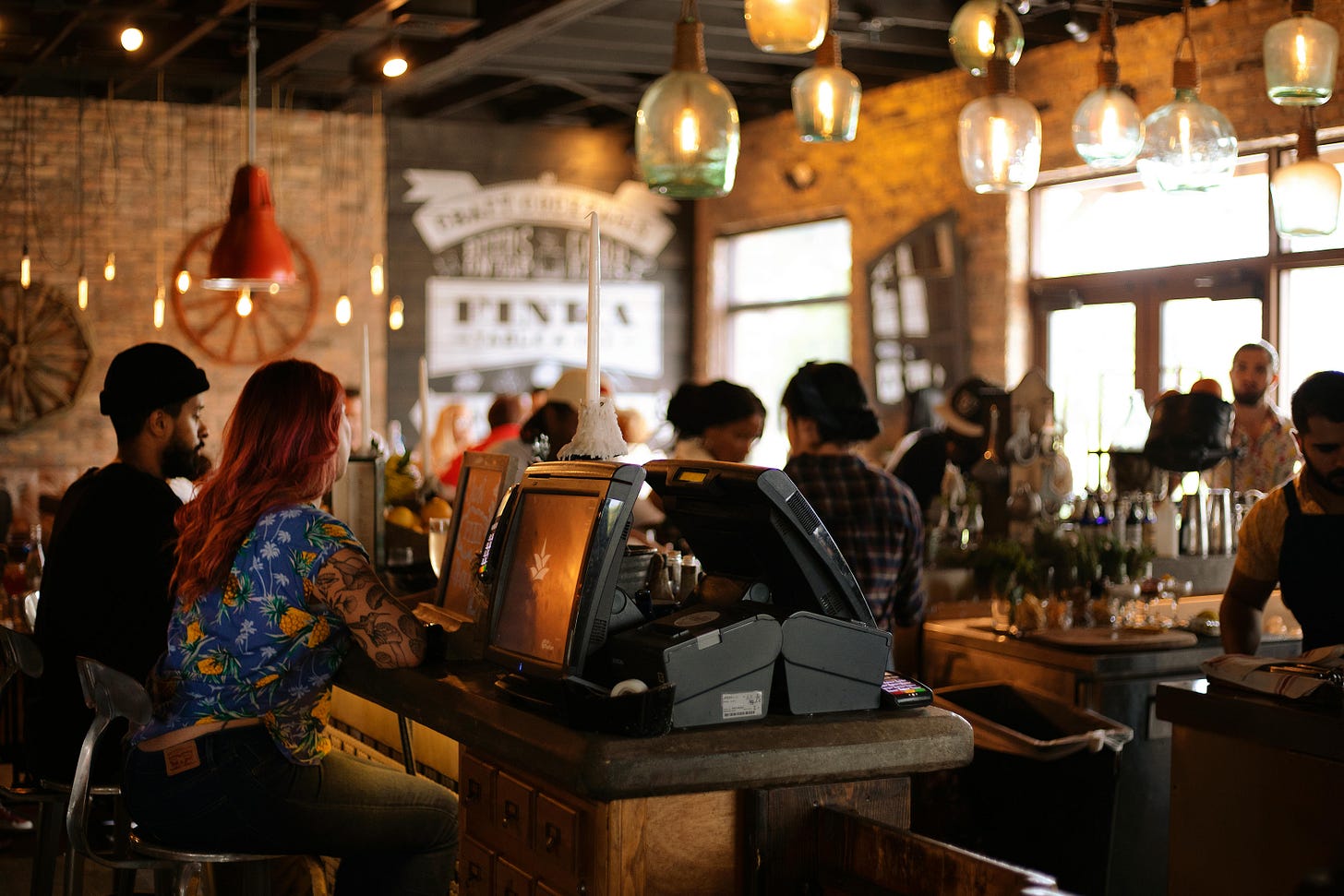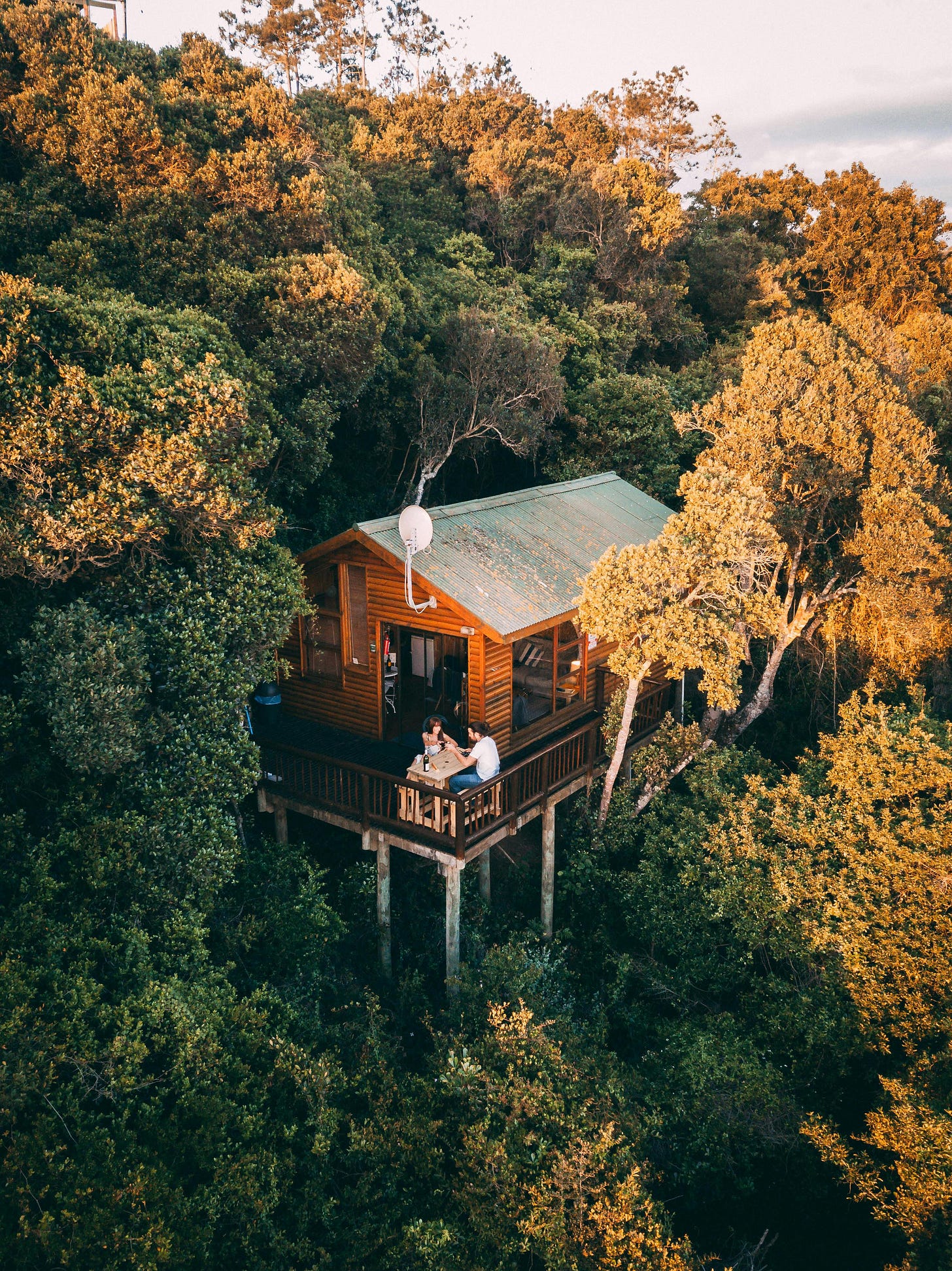Analog Socializing: Reporting from the Present
In dialogue with fellow American writer and Substacker Shelley Ruelle of Rome
My friend Shelley and I have an open thread on WhatsApp. The other day I tossed out some catch-and-release bon mot and said, that would be a good essay.
What I said: Our predominant method of interacting with people now is implicitly dehumanizing.
And lo, it became a shared dialogue with Shelley at her encouragement, who often finds herself mulling the same topics in Rome as I am in Florence. Shelley writes The Interior Castle on Substack - I confess I love the title for its Spanish mysticism and general sense of ecumenical exploration.
Let’s not lose that thought! she urged.
We decided to offer simultaneously a record of our chat, which we ironically wish could have taken place in the meatspace, preferably in a caffè in Rome or Florence, but here we are, bending a knee to constrictions of time and space. And so it goes.

Monica:
Our predominant method of interacting with people now is implicitly dehumanizing.
People need to talk to people, be with people, to feel secure.
I feel lucky to have come of age in the 70s and 80s, perhaps the last cohort to graduate from high school without ever having heard of the internet. We socialized at school and when we got home we talked to (or physically ignored) parents and siblings and dominated the landline with voice calls until our parents told us to stop.
I do think part of being properly socialized - and thus empathic and civic-minded - is to be in community with others, and by this I mean not simply having a convivial time, but also entering into and coming out of conflict. We need these experiences to hone these skills. And without these skills we suffer as individuals - and society suffers as a whole.
Communities really took a one-two punch with social media (2006 - present). Facebook and its offspring were Punch One, succinctly captured in this poem by Sherman Alexie:
The Facebook Sonnet
Welcome to the endless high-school
Reunion. Welcome to past friends
And lovers, however kind or cruel.
Let’s undervalue and unmend
The present. Why can’t we pretend
Every stage of life is the same?
Let’s exhume, resume, and extend
Childhood. Let’s all play the games
That occupy the young. Let fame
And shame intertwine. Let one’s search
For God become public domain.
Let church.com become our church.
Let’s sign up, sign in, and confess
Here at the altar of loneliness.
The Covid pandemic (2020 - 2022) was Punch Two. Work, school, and friendships moved online. Zoom stock went through the roof. We stayed home for months and years and everything happened all at once. Everyone lost track of time, events, themselves, whirling in a sea of fear and news. It tapered off eventually - the pandemic, I mean - but we’re stuck with the carapace of digital lives.
I wonder if my kids (now aged 10 and 13) will rebel by moving into the forest to live in a treehouse with other people and no devices. They’ll never want to search for anything ever again, or look anything up, or instant message anyone for any reason. Analog socializing will become the new gold standard, the biggest rush, the most authentic interaction.
Shelley:
I’m not sure what your kids will decide, but I’d be more than happy to move into the forest to live in a treehouse with other people and no devices!
I think those of us—probably predominantly Gen Xers—who are eventually going to be the last living vestiges of a pre-Internet society, have our feet in both worlds. I can’t imagine what life is like on the inside for a digital native, what it’s like for my own kids who are now teenagers (ages 16, 14, and 14) and never knew a world before the digital revolution.
When I was a kid, I looked things up in the library using card catalogs and the Encyclopedia Britannica. On my home phone and TV growing up, there were actual physical dials you had to turn. On the TV the channels went from 2 to 13. Mysteriously, channels 2 and 3 never had any programming (and thus eventually got assigned to connect to the VHS—Video Home System—to play our video cassette rentals). We used a pocket-sized weekly magazine called TV Guide to see what was on, and if you only had one TV at home, you had to do some serious negotiating to watch your show.
If you know, you know.
These things matter though, because they forced us to move slower and choose between fewer options. I honestly think our brains work differently as a result. I don’t think more is better, necessarily.
It’s interesting what you say about “entering into and coming out of conflict” as a way to become more empathetic and civic-minded, because it could also apply as a pretty good definition of what happens most of the time on social media. But that feels like dehumanized conflict, devoid of any real emotional risk, vulnerability, or investment.
Monica:
I don’t feel that social media trains humans very well for dealing with conflict. It gives us a firehose to unleash feelings on both sides, and people walk away while the fire continues unabated.
Indeed, social media encourages - goads - people into sharing their feelings and opinions, and to turn up the volume, but how does it teach us to listen and respond from a place of respect? Everyone just batters the nearest avatar and walks away when they’ve had enough. People say things online that they would never dare to in person.
But now, perhaps after years of practice, they would, and we’re seeing the collapse of social courtesy in many ways because of that. Online socializing has eroded the foundation of analog socializing, and as humanity we’re losing so much because of it:
Courtesy
Patience
Forgiveness
Warmth
Cordiality
Second chances
Authenticity
True exchange
Friendship and feelings on a human scale and at a human depth…
What do you think?
Shelley:
I absolutely agree that “hiding behind screens” has empowered a lot of people to put things out there that, if in person, they wouldn’t have. In order to hash out conflict in person, you either have to organize an in-person meeting, or if it's a conflict that comes up spontaneously in person, you have to make on-the-spot decisions that take into account the context and the other people involved. Your entire body is involved, as well as your observations of the body language of all the people around you, and the circumstances of the physical world around you at that moment. That's a lot of information that influences how you approach and move through that conflict.
Online, two factors seem to be the most prevalent: speed of response and flashiness of opinion. Online interaction encourages people to respond immediately, when we're in fight/flight/freeze mode and our responses aren't as measured, thoughtful or rational as they would be once we've had time to reflect. Plus, social media culture has created a society of people who think they need to express their opinion about everything, all the time.
Again, the urgency is something I think is really counterproductive to a balanced way of being in the world. There are no opinion emergencies. I think our nervous systems would all benefit from slowing down, waaaay down. And in-person interactions by their very definition require us to do this.
Monica:
When my family and I returned to Italy more or less for good in 2016, the relatively slower pace of life here was an important pull factor for me. That, combined with what I call “life on a human scale” - living in almost any city in Italy, you can walk to get whatever you need, and a longer trip involves a bike. That’s the case for me here in Florence, anyway. When you can only get somewhere as fast as you can walk or pedal, I am convinced that your perception of time and distance adjust to correspond to the human scale.
But now people are addicted to velocity. They’re so used to getting things quickly that they cannot imagine slowing down, because slower, in late-capitalist postmodern culture, means less profitable, less sexy, less worthwhile. This is the case in cities around the world, in many pockets of culture - America does not stand alone in this. Online culture has become timestamped to the millisecond. But humans did not evolve to move this quickly in action, or in thought. I mean, that’s why we invented machines and computers, right?
I have a poem on this very topic that I wrote over a year ago:
Rallentare
every year it all notches faster
everyone says, there’s barely enough time to
breathe, much less think
we slice our seconds increasingly thin
pld-fashioned, we miss the morningtide,
noontide, followed by calm eventide.
Free us from the bars of timestamps,
give us kerosene lamps.
No one can maintain with this speed
hearts never meant to beat so hard
breathing so shallow and fast
nights over before they begin
we can never win! the speed must slow
our feelings cannot stitch to words
we long to gather the pieces
we’ve lost our loose untethered way
Shelley:
What you wrote made me think of Tricia Hersey and her work around refusing grind culture and promoting rest as a form of resistance. Here are a few of her words from an article in Atmos:
"Everything is in collaboration in this culture, working together for us not to rest.
It’s deeply disturbing to see what the culture has done to us. Capitalism is so violent, white supremacy is so violent, the grind is so violent. I always believe in hope, but sometimes I wonder, “Has the beast eaten so many of us up? Is it too late for some of us? Can we ever shift what is happening?”
But that is the beauty of hope, of understanding that we can imagine a new world. We can create a temporary space of joy and freedom. And that moment matters, however small."
So this is what I cling to. The heart of what sparked this conversation of ours, the idea that analog socializing has something to offer us, is one way of creating what Hersey calls here "a temporary space of joy and freedom." So in that way, perhaps we could even add analog socializing as a form of resistance.
Monica:
Now I totally want to rewatch Jane Campion’s biopic on John Keats, Bright Star.
Someone put me in an orchard carpeted with bluebells and a blank book. Let me watch the turning seasons with an anam cara, let me take in the changing light. Let me live on a human scale. I don’t want to be the futuristic wreck of modern culture like that one segment of Cloud Atlas, what’s left of the human race hanging on meat hooks.
Now I want to rewatch Cloud Atlas too.
Art and lit will save us. Slow it down, bring it back, help us breathe, make us really think. Enough of the madcap.






Having grown up in the 1950’s and 60’s I don’t know where to start, the digital age is all very well in some ways, can be convenient for taking care of business, until something goes wrong…? Then? It’s nice to keep tabs on friends but the practice of writing a letter has almost gone away. Your exchange is food for thought, thanks.
Your reflections remind of a book by Kosuke Koyama, The 3 mile an hour God (1979). Jesus walked everywhere (at 3 miles an hour) so he encountered people on his journeys and could walk with them.